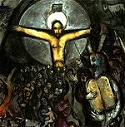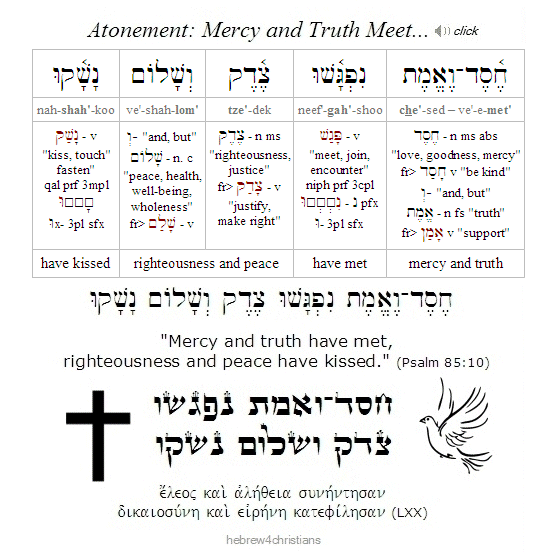|
Yom Teruah, or "Rosh Hashnah," remembers God as our Creator and Judge (ūÉū£ūĢūöūÖūØ ū®ūöūĢūÉ ūæūĢū©ūÉūĀūĢ ūĢū®ūĢūżūśūĀūĢ). Indeed everything begins with the foundational truth that Almighty God is our personal Creator (ūöųĘūæų╝ūĢų╣ū©ųĄūÉ). This is the first principle of all rational thinking: "In the beginning (ūæų╝ų░ū©ųĄūÉū®ūüų┤ūÖū¬), God created the heavens and the earth" (Gen. 1:1). Notice that the word "beginning" (i.e., bereshit) is based on the term rosh (ū©ūÉū®ūü, "head"), and therefore points to "the head of (all things)," namely God (ūÉų▒ū£ūöų┤ūÖūØ). God must be the starting point of all our thinking about life; God is the Axiom of Reality; the First Principle of all Being...
ūæų╝ų░ū©ųĄūÉū®ūüų┤ūÖū¬ ūæų╝ųĖū©ųĖūÉ ūÉų▒ū£ūöų┤ūÖūØ
ūÉųĄū¬ ūöųĘū®ų╝ūüųĖū×ųĘūÖų┤ūØ ūĢų░ūÉųĄū¬ ūöųĖūÉųĖū©ųČūź
be┬Ęrei┬Ęsheet bah┬Ęrah e┬Ęloh┬Ęheem
et ha┬Ęshah┬Ęma'┬Ęyeem ve┬Ęet hah┬Ęah'┬Ęretz

"In the beginning God created
the heavens and the earth."
(Gen. 1:1)
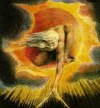
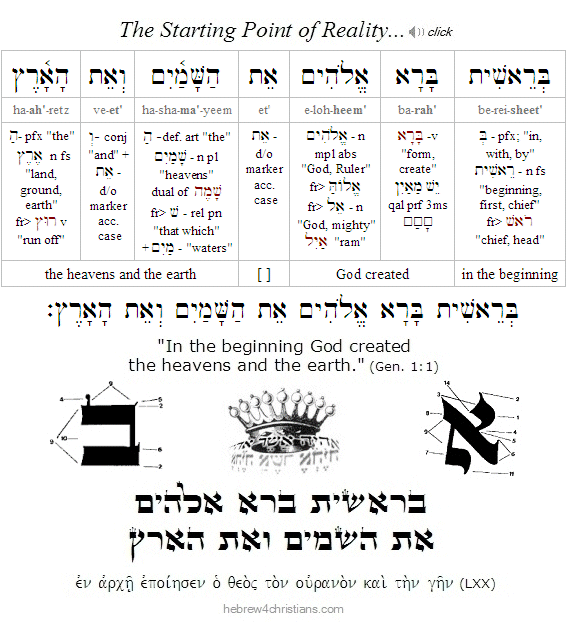 |
The Torah relates that God began creating the heavens and the earth in the darkness of the primordial yom rishon (ūÖūĢūØ ū©ūÉū®ūĢū¤, again derived from ū©ūÉū®ūü), the "first day," (conventionally called "Sunday" in our modern calendars). "The earth was without form and void (ū¬ūöūĢų╝ ūĢųĖūæūöūĢų╝) and darkness was over the face of the deep, and the Spirit of God (ū©ūĢų╝ūŚųĘ ūÉų▒ū£ūöų┤ūÖūØ) was brooding over the face of the waters, and God said, 'Let there be light' (Gen 1:2-3). Notice that the triune nature of the Godhead is revealed in the first verses of the Torah: the Divine Voice cannot be separated from God, no more than the Spirit of God can be so separated.
The Biblical day (ūÖūĢų╣ūØ) begins in the evening: "and there was evening and there was morning, the first day." This pattern, vayhi erev, vayhi voker (ūĢųĘūÖų░ūöų┤ūÖųŠūóųČū©ųČūæ ūĢųĘūÖų░ūöų┤ūÖųŠūæū¦ųČū©), "and there was evening and there was morning," recurs for each of the six days of creation, including the sixth day, when God created man (Adam and Eve). Therefore the work of creation ("ma'aseh bereshit") was completed by the end of the sixth day (i.e., Friday in our modern calendars).
When Adam first opened his eyes and human consciousness was born, he immediately understood that the LORD created all things, including himself. According to midrash, Adam's first words were, ūÖūöūĢūö ū×ųČū£ųČūÜų░ ūóūĢų╣ū£ųĖūØ ūĢųĖūóųČūō / Adonai malakh olam va'ed: "The LORD is King for ever and ever." God then said, "Now the whole world will know that I am King," and He was very pleased. This was the "tov me'od" (ūśūĢų╣ūæ ū×ų░ūÉūō) moment of creation, when God saw all that He had made "and found it very good" (Gen. 1:31). The birthday of humanity is therefore the Coronation Day for the King of the Universe. According to Jewish tradition, this date represents Rosh Hashanah, or the "head of the year" for humanity, when God began to rule as King over the universe He created.
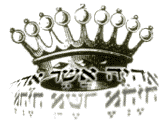 |
The implication that God is our Creator is enormous and pervades everything else in our lives. God's creative power is witnessed by all conscious life. The Divine Light that was created before the sun and the stars represents God's immanent presence that "lights up" all of creation - including our minds (Gen. 1:3). Since we were created b'tzelem Elohim, "in the image of God," the witness of God's truth is foundational to all of our thinking as well. The revelation (not the invention) of logical first principles is part of God's "signature," if you will, of how the mind is wired to reality. Likewise we have intuitive awareness regarding the existence of moral truth (i.e., the standard of justice and moral law), aesthetic truth (i.e., ideals of beauty, goodness, worth, and love), and metaphysical truth (i.e., cause and effect relationships). "The heavens are recounting the glory of God, and the expanse is proclaiming his handiwork" (Psalm 19:1). God's power and presence can be clearly inferred from the tremendous effect of the universe itself. As Paul stated, "the invisible things of Him (ŽäßĮ▒ ß╝ĆßĮ╣Žü╬▒Žä╬▒ ╬▒ßĮÉŽä╬┐ß┐”) from the creation of the world are clearly seen (╬║╬▒╬Ė╬┐ŽüßĮ▒Žē), so that people are without excuse" (Rom. 1:19-20). It is the fear of the LORD (ūÖų┤ū©ų░ūÉųĘū¬ ūÖūöūĢūö) that is truly the beginning of wisdom and knowledge (Psalm 111:10; Prov. 1:7; 9:10). The Hebrew word for fearing (ūÖū©ūÉ) and seeing (ū©ūÉūö) share the same root. We cannot truly see reality apart from reverencing God as the Lord and King of Creation.
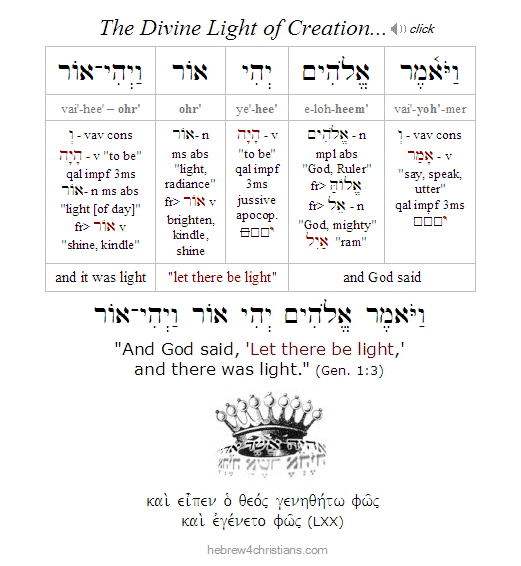 |
It is important to emphasize that God is not some impersonal "First Cause" or "Unmoved Mover" of the universe. He is not some "cosmic big bang" that started the universe only to be indifferent to its functioning, nor is God a "Cosmic Egg" or "Self-Absorbed Mind" that contemplates the navel of reality... No, God is an entirely awake and morally perfect Being who created everything "very good" and who actively engages and sustains His creation. God is a personal Creator and Ruler of all that exists. In theological jargon, God is both "immanent" (sustaining and upholding creation) and "transcendent" (exalted over creation). This God has a Name (YHVH), a mind, and a moral, purposive will that imbues all of creation. God is LORD over all time and space, the King of Glory, who is Master of all possible worlds. He is therefore intimately concerned with the rule of His law, expressed both in the "natural" world (i.e., the laws of physics, chemistry, etc.), the mental world (i.e., the laws of logic, mathematics, etc.), the ethical world (i.e., the laws of morality, ethics, etc.), and the spiritual world (the laws of spirit and of spiritual beings).

When God revealed to Moses the meaning of the Name "LORD" (i.e., YHVH: ūÖūöūĢūö), he was given the revelation of Shelosh Esrei Middot - the 13 attributes of God's Mercy (Exod. 34:6-7). The LORD described Himself as a God who is merciful and gracious, slow to anger, and abounding in love (chesed) and truth (emet), who guards love and carries (ūĀųĖū®ūéųĖūÉ) iniquity (ūóųĖūĢų╣ū¤), transgression (ūżų╝ųČū®ūüųĘūó), and sin (ūŚųĄūśų░ūÉ), but who will not clear the guilty... In other words, because the LORD is holy and righteous, he cannot leave the guilty unpunished. This follows from the fact that God cannot lie (Num. 23:19; Titus 1:2). Since God necessarily must be true to His nature, he cannot negate the truth or violate justice. The LORD cannot sweep sin "under the rug" or pretend that it is not there.
Notice that the love of God does not negate His righteousness and justice. The LORD can never overlook His rule as our Creator and His moral will as our Judge:
ūøų╝ų┤ūÖųŠū”ųĘūōų╝ų┤ūÖū¦ ūÖų░ūöūĢųĖūö ū”ų░ūōųĖū¦ūĢų╣ū¬ ūÉųĖūöųĄūæ
ūÖųĖū®ūüųĖū© ūÖųČūŚų▒ū¢ūĢų╝ ūżųĖūĀųĄūÖū×ūĢų╣
kee-tza┬Ędeek Adonai tze┬Ędah┬Ękoht ah┬Ęheiv
yah┬Ęshar ye┬Ęche┬Ęzoo fah┬Ęney'┬Ęmoh

"For the LORD is righteous; he loves righteous deeds;
the upright shall behold his face." (Psalm 11:7)

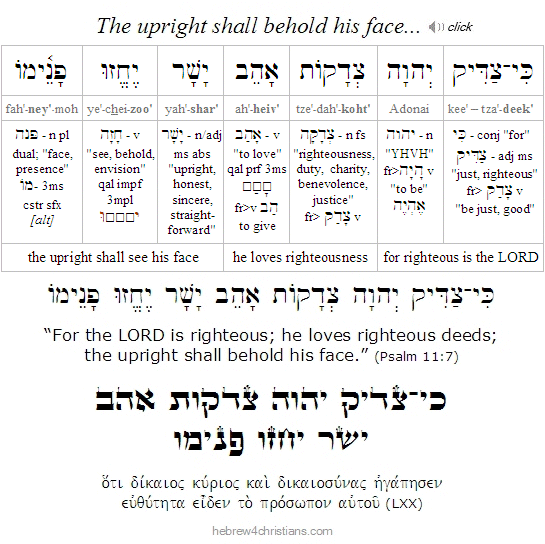
Indeed, the very "foundation" or "habitation" (i.e., machon: ū×ųĖūøūĢų╣ū¤) of God's throne is righteousness and justice, as it is written:
ū”ųČūōųČū¦ ūĢų╝ū×ų┤ū®ūüų░ūżų╝ųĖūś ū×ų░ūøūĢų╣ū¤ ūøų╝ų┤ūĪų░ūÉųČūÜųĖ
ūŚųČūĪųČūō ūĢųČūÉų▒ū×ųČū¬ ūÖų░ū¦ųĘūōų╝ų░ū×ūĢų╝ ūżųĖūĀųČūÖūÜųĖ
tze┬Ędek oo┬Ęmeesh┬Ępaht me┬Ękhon kees┬Ęe'┬Ękha
che'┬Ęsed ve┬Ęe┬Ęmet ye┬Ęka┬Ęde┬Ęmoo fah┬Ęney'┬Ękha

"Righteousness and justice are the foundation of Your throne;
lovingkindess and truth meet before You." (Psalm 89:14)
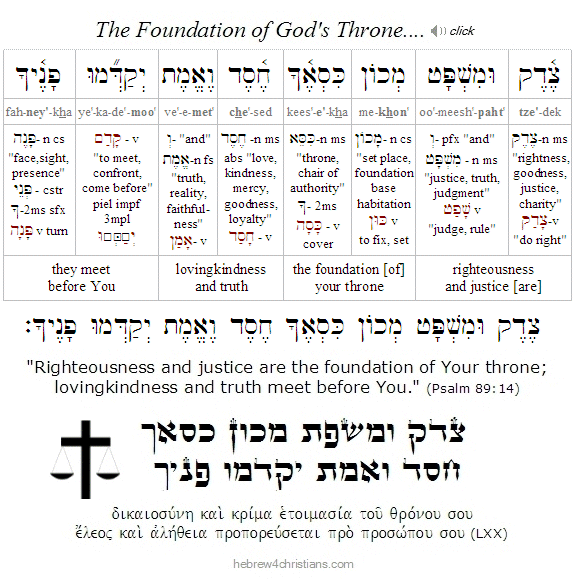
While it is true that God is love, it is also true that He is righteousness and justice, and these attributes of His nature cannot be divided or separated. It is written in our Scriptures: ū”ųČūōųČū¦ ūĢų╝ū×ų┤ū®ūüų░ūżų╝ųĖūś ū×ų░ūøūĢų╣ū¤ ūøų╝ų┤ūĪų░ūÉųČūÜųĖ - "righteousness and justice are the foundation of Your throne" (i.e., the symbol of His Kingship). The King of the Universe commands those created in His image and likeness to observe His will (i.e., moral law), and sin is expressly defined as "lawlessness" (ß╝Ī ß╝ü╬╝╬▒ŽüŽäßĮĘ╬▒ ß╝ÉŽāŽäßĮČ╬Į ß╝Ī ß╝Ć╬Į╬┐╬╝ßĮĘ╬▒), understood to mean the repudiation of God's authority to rule (1 John 3:4). Sin is therefore essentially a form of high treason against God's Kingship and authority, and the demand to be autonomous ("self governing") is the (vain) attempt to take the crown from God Himself.
All human beings are sinners who share in the "fallenness" of the Adam ha-rishon (Rom. 3:23; 5:12). We do not just commit sins, as if they were "accidental" to our nature, but we are sinners in the sense that sin is part of our "heart" or core personality structure (Eph. 2:3; Matt. 15:19). We all afflicted with the lethal disease of "spiritual death," and our falleness has "noetic" implications: "The mind (ŽäßĮĖ ŽåŽüßĮ╣╬Į╬Ę╬╝╬▒) that is set on the flesh is hostile (ß╝öŽć╬ĖŽü╬▒) to God, for it does not submit to God's law; indeed, it cannot" (Rom. 8:7).
Since God is perfectly righteous, sin must be judged for what it really is: treason against His loving and righteous will. Both the human conscience and the revealed will of God (i.e., the moral law contained in the Torah of Moses) clearly indict all mankind of treason before the tribunal of a Holy and Righteous God. Indeed, every mouth will be stopped before the bar of the Holy One's judgment (Rom. 3:19).
The Scriptures plainly teach that the penalty for sin is death (Gen. 2:16-17; Rom. 6:23; Isa. 59:2, Ezek. 18:4). Physical death is a symptom of the deeper and more serious problem of eternal, or spiritual, death. Just as physical death represents the separation of the soul from the body, so spiritual (or eternal) death represents the separation of the soul from the Presence of God. Spiritual death is pictured as hell, a place of eternal suffering and horror (Mark 9:43; Rev. 20:10). Hell is described using frightful metaphors in Scripture. It is said to be a fiery pit (Matt. 18:8-9), an eternal fire (Matt. 25:41, Jude 7), a lake of fire (Rev. 20:15), a place of "outer darkness with weeping and gnashing of teeth" (Matt. 8:12; 13:50; Rev. 21:8), and a place of eternal punishment (Matt. 25:46). These are horrific images of warning intended to shock us out of our spiritual stupor... Wake up! Your life matters and everything you do has eternal weight and significance!
The "bad news" about the death sentence caused by our sin is not the end of the story, thank God... Even at the very beginning, after Adam and Eve had sinned, the "good news" of God's redemption was first mentioned (i.e., the "proto-euangelion" of Gen. 3:15). After pronouncing judgment and exiling Adam and Eve from the original paradise, the LORD prophesied that a cosmic struggle for the fate of humanity would ensue. Through his machinations, Satan (represented by the nachash, or serpent) had arrogated a legal or forensic "right" to humanity, who were now under God's judicial kelalah (curse). However, the LORD foretold that the curse would be rescinded by means of the Seed (ūöųĘū¢ų╝ųČū©ųĘūó) - the Mashiach - who would "crush the head" of the serpent and ransom those who were sold to sin. There is good news behind the bad news, then, just as Yeshua is described as the Lamb slain from the foundation of the world (1 Pet. 1:20, Eph. 1:4, Rev. 13:8, 17:8). The grand narrative of the Scriptures then serves as God's loving response to the "bad news" of mankind's sin.
The promise of the Kingdom of God (ū×ųĘū£ų░ūøūĢų╝ū¬ ūöųĖūÉų▒ū£ūöų┤ūÖūØ) made manifest upon the earth has long been the hope of the Jewish people. The prophets had long foretold a coming day of redemption for Israel when Zion would be made the praise of all the earth. Zion therefore represents the restoration of paradise lost, and summarizes Jewish philosophy of history. The concept of the King Messiah, the "Anointed One" who would one day come to deliver his people from oppression at the beginning of an era of world peace has been the sustaining hope of the Jewish people for generations. King Messiah is the instrument by whom God's kingdom will be established in Israel and in the world.
When Yeshua came preaching the "good news of the Kingdom," his message was not readily received by the Jewish leadership. After all, they were expecting a political Messiah who would deliver Israel from worldly oppression and establish universal peace. Yeshua, however, taught that the Kingdom of God was "not of this world" (Luke 17:21; John 18:36) and therefore focused on redeeming citizens who would be enabled to enter it. In other words, the first order of business was to redeem a kingdom people to inherit the kingdom, but that required a solution to the problem of sin (Col. 1:12).
Hence Yeshua came as the "Lamb of God" (ū®ūéųĄūö ūöųĖūÉų▒ū£ūöų┤ūÖūØ) who would fulfill the imagery given in the Akedah of Isaac, the blood of the "pass over" lamb, and indeed all of the sacrifices defined in the Torah. The "korban principle" of "life-for-life," the innocent sacrificed for the guilty, implied the idea of "penal substitution" for the trusting sinner. The guilty person would lean his hands upon the head of the animal (semichah) and then confess: "I deserve to die instead of this innocent animal, but the LORD mercifully accepts the death of this innocent one in my stead." The worshipper would understand that were it not for chasdei Adonai (ūŚų▓ūĪų░ūōųĄūÖ ūÖūöūĢūö) - the sacrificial love of the LORD - the victim's fate should have been his own. When the LORD saw the shed blood and ascending smoke of the sacrifice, He forgave the sinner based on his faith and teshuvah (repentance). The entire sacrificial system - which constitutes over 40% of all the commandments given in the Torah - was therefore predicated on the idea of substitutionary atonement given on behalf of the repentant sinner. Without blood atonement, there is simply no sense to the elaborate sacrificial system given in the Torah. The life of the flesh is in the blood -- given to make "atonement" upon the altar (Lev. 17:11). The entire system was set up to "point to" the coming sacrifice of the Messiah Himself of whom the prophets foretold (Isa. 53, Psalm 22, Zech. 12:10, etc.).
The Jews wanted King Messiah to vanquish the enemies of Israel, but Yeshua presented Himself as the Suffering Servant whose death would redeem us from the debt incurred through our sin (Gal. 3:13-14; 2 Cor. 5:21). By so doing, Yeshua made it possible for God to forgive us and to impart to us the inheritance of the Kingdom of God (Col. 1:12). The shared suffering of the Heavenly Father and Yeshua was the means by which "justice and peace have kissed," thereby restoring the children of promise to their original inheritance:
ūŚųČūĪųČūōųŠūĢųČūÉų▒ū×ųČū¬ ūĀų┤ūżų░ūÆų╝ųĖū®ūüūĢų╝
ū”ųČūōųČū¦ ūĢų░ū®ūüųĖū£ūĢų╣ūØ ūĀųĖū®ūüųĖū¦ūĢų╝
che'┬Ęsed ve┬Ęe┬Ęmet neef┬Ęgah'┬Ęshoo
tze'┬Ędek ve┬Ęshah┬Ęlohm nah┬Ęshah'┬Ękoo

"Love and truth have met,
justice and peace have kissed."
(Psalm 85:10)

Yeshua's first words of public ministry were "Repent and believe the gospel" (Mark 1:15). The word "repent" is metanao (╬╝╬ĄŽä╬▒╬Į╬┐ßĮ│Žē), meaning "change your thinking" (i.e., transcend your fears and prejudices) and the word "gospel" means "good news" (i.e., ╬ĄßĮÉ╬▒╬│╬│ßĮ│╬╗╬╣╬┐╬Į, from , ╬ĄßĮ¢- "good," and ß╝ä╬│╬│╬Ą╬╗╬┐Žé, "message"). We could therefore translate the verse as: "Change your thinking and believe the message of God's good will toward you." When the Apostle Paul later testified of his dramatic conversion experience on the Road to Damascus, the resurrected Messiah commissioned him to go to the nations in order to "open their eyes, so that they may turn (ß╝ÉŽĆ╬╣ŽāŽäŽüßĮ│ŽåŽē) from darkness to light and from the power (i.e., authority, ß╝É╬Š╬┐ŽģŽāßĮĘ╬▒) of Satan to the power of God, that they may receive forgiveness of sins and a place among those who are sanctified by faith in me" (Acts 26:18).
Humanity's greatest need is to be loved and accepted by God, but this requires a solution to the problem of sin. A "good judgment" from heaven, however, cannot be obtained through self-justification or through "works of righteousness which we have done" (Titus 3:5). The "books" are opened in heaven with a detailed record of all our sinful acts (Rev. 20:12). The violation of God's law requires atonement. Yeshua is God's exclusively appointed Sin Bearer, and only by means of trusting in his sacrificial death on the cross are we are declared not guilty (or "justified") by faith. Only God can justify the ungodly (Rom. 4:5) and "clothes" us with His own righteousness (see Zech. 3:1-5). Salvation is of the Lord. In the end, the only righteousness that really matters is the righteousness of God... We must renounce all hope of other approaches or defenses. None of us is righteous, "no, not one" (Psalm 14:2-3; Rom. 3:10). All our righteousness is as "filthy rags" before the throne of Heaven: "We have all become like one who is unclean, and all our righteous deeds are like a polluted garment. We all fade like a leaf, and our iniquities, like the wind, take us away" (Isa. 64:6).
The righteousness of Yeshua is the gospel message itself, that is, the power of God to save us from the verdict of our sinful condition (eternal death) and to restore our relationship with a holy and morally perfect God (eternal life). God will not clear the guilty, but He does something infinitely better: He removes the guilt! The curse of the Law's verdict upon us has been taken away through the substitutionary sacrifice of Yeshua upon the cross at Moriah (Gal. 3:10-13; James 2:10; 2 Cor. 5:21). The sting of death is sin, and the power of sin is the law (ß╝Ī ╬┤ßĮ╗╬Į╬▒╬╝╬╣Žé Žäß┐åŽé ß╝ü╬╝╬▒ŽüŽäßĮĘ╬▒Žé ßĮü ╬ĮßĮ╣╬╝╬┐Žé), but God gives us the victory (╬Įß┐¢╬║╬┐Žé) by imputing our sin to Yeshua and ascribing His righteousness to us in exchange (1 Cor. 15:56-58; 2 Cor. 5:21). By sincerely turning to Him in confession of our condition and trusting in His righteousness we are declared legally "justified" (i.e., "just-if-I'd" never sinned and "just-if-I'd" always obeyed) before the Judge of the World. Moreover, through our union with Yeshua, we share in the vindication of His resurrected life and have peace with God (Rom. 5:1). To be justified is to share in Yeshua's righteousness: Adonai Tzidkenu!
Jim Eliot once said, "He is no fool who gives what he cannot keep to gain what he cannot lose." Repentance means changing your mind by turning to God. When we turn toward God's embrace, we necessarily turn away from selfishness and sin. Truly surrendering to God's rule as your King means that you will perform "deeds in keeping with repentance" (Acts 26:20). You will begin to live as a citizen of the Kingdom of God - even though you still suffer as a "stranger and pilgrim" in this world (Col. 1:13; 1 Pet. 1:5; Heb. 11:13). One day soon the Messiah will return to establish His reign in Zion (Isa. 11:9). Ultimately God will create a new world for His redeemed people, free from the ravages of sin and death (Isa. 65:17-19).
Abraham Heschel once wrote, "God is of no importance unless he is of supreme importance," and while that is undoubtedly true, what is of supreme importance to God is the salvation of the lost sinner (John 3:16; Luke 19:10; 2 Pet. 3:9). But God has entrusted you and me to help others come into the Kingdom. He wants us to help bring in the great harvest (John 4:35)! God could use angels to issue the call to "repent and believe" the gospel, or He could put great signs in the heavens, but in His infinite wisdom He has chosen to use the "foolishness" of proclaiming the truth of the cross of Yeshua to save those who are lost. But note that the cross is the central focus. As Paul wrote, "For I decided to know nothing among you except Yeshua the Messiah and him crucified (1 Cor. 2:2). This is of first importance to God (1 Cor. 15:3). The sacrificial death of Yeshua is a scandal to the proud, but it is the method God uses to save people from eternal death (1 Cor. 1:22-23). There is NO GOSPEL MESSAGE apart from offense - first, the offense of the ego's deflation (i.e., being convicted as a rebel deserving of judgment), and second, the offense of the sross (i.e., that no human merit can effect the salvation given through Yeshua ALONE). The offense of the gospel is the proclamation that there is no other way to heaven than through the cross of Yeshua, and there is no other Name than the Name of Yeshua for the salvation of human beings (John 14:6; Acts 4:12; 1 Cor. 1:23).
Our great duty as followers of Yeshua is to make much of His salvation... The Ruach HaKodesh always glorifies our Messiah, the Son of Man (John 16:13-14). But as Paul asked, "How then will they call on him in whom they have not believed? And how are they to believe in him of whom they have never heard? And how are they to hear without someone preaching (i.e., ╬║╬ĘŽüßĮ╗ŽāŽāŽē, "publishing, or "proclaiming openly") the message (Rom. 10:14)? Likewise Yeshua commanded his followers to "go and make disciples (i.e., talmidim: students) from among all the nations, immersing them into the reality of the Father, the Son and the Ruach HaKodesh, teaching them to obey all that I have commanded you" (Matt. 28:18-19). The proclamation of the gospel is one of your greatest responsibilities as a follower of the Lord.
Yeshua is the "propitiation" or "expiation" for our sins. The Greek word used in Romans 3:25, 1 John 2:2, and 1 John 4:10 (i.e., ß╝▒╬╗╬▒ŽāŽäßĮĄŽü╬╣╬┐Žé) is the same word used in the LXX for the kapporet [cover of the ark of the covenant] in the Holy of Holies which was sprinkled with the blood of the sacrifice on Yom Kippur. "For by one offering he hath perfected for ever them that are sanctified" (Heb. 10:14). Those who are trusting in Yeshua as their Atonement before the Father are thereby declared tzaddikim and their names are written - and sealed - in the Book of Life.
The Day of Judgment for our sinful lives has come in the Person of Yeshua the Mashiach, blessed be He. All those who truly belong to Him are written in the "Lamb's book of life," or Sefer HaChayim (Phil. 4:3; Rev. 3:5; 13:8; 17:8; 20:12, 15; 21:27; 22:19).
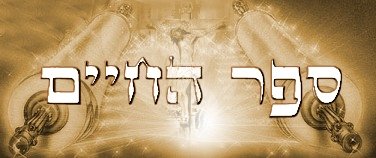 |
Addendum: Yeshua is the Creator
During Rosh Hashanah we remember that God is our Creator and Judge, and both of these attributes refer to Yeshua our Savior. The New Testament identifies the Voice of the Creator as the all-powerful Word of God: ūæų╝ų░ū©ųĄūÉū®ūüų┤ūÖū¬ ūöųĖūÖųĖūö ūöųĘūōų╝ųĖūæųĖū© / "in the beginning was the Word" (John 1:1,14). Yeshua is the Source of all life in the universe: ūøų╝ųĖū£ųŠūöųĘū×ų╝ųĘūóų▓ū®ūéų┤ūÖūØ ūĀų┤ūöų░ūÖūĢų╝ ūóųĘū£ųŠūÖųĖūōūĢų╣ / "All things were made by Him (John 1:3). The "Word made flesh" is the "image of the invisible God" and the "radiance of the glory of God and the exact imprint (Žć╬▒Žü╬▒╬║ŽäßĮĄŽü, 'character') of his nature" (John 1:14, Col. 1:15). All of creation is being constantly upheld by the word of His power (Heb. 1:3): "All things were created by Him (i.e., Yeshua), and for Him" and in Him all things consist (ŽāŽģ╬Į╬ĄŽāŽä╬Ę╬║╬Ą╬Į, lit. "stick together") (Col. 1:16-17). Creation begins and ends with the redemptive love of God as manifested in the Person of Yeshua our Messiah... He is the Center of Creation - it's beginning and end. As it is written: ūÉųĖūĀūøų┤ūÖ ūÉųĖū£ųČūŻ ūĢų░ū¬ųĖūĢ ū©ų┤ūÉū®ūüūĢų╣ū¤ ūĢų░ūÉųĘūŚų▓ū©ūĢų╣ū¤ ū©ūÉū®ūü ūĢųĖūĪūĢų╣ūŻ / "I am the 'Aleph' and the 'Tav,' the First and the Last, the Beginning and the End" (Rev. 22:13). Indeed, Yeshua is ū×ųČū£ųČūÜų░ ū×ųĘū£ų░ūøųĄūÖ ūöųĘū×ų╝ų░ū£ųĖūøų┤ūÖūØ / Melech Malchei Hamelachim: The "King of kings of kings." He is LORD of all possible worlds -- from the highest celestial glory to the dust of death upon a cross... ūÖų░ūöų┤ūÖ ū®ūüųĄūØ ūÖūöūĢūö ū×ų░ūæū©ųĖūÜų░ / yehi shem Adonai mevorakh: "Let the Name of the LORD be blessed" forever (Psalm 113:2).
|

